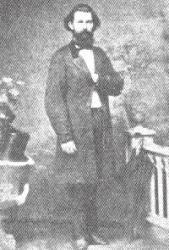Planning worship?
Check out our sister site, ZeteoSearch.org,
for 20+ additional resources related to your search.
- |
User Links
Search Results
Tell me not in mournful numbers
Author: Longfellow Appears in 67 hymnals Used With Tune: SICILY
Tell me not in mournful numbers
Tell me not in mournful numbers
Author: Longfellow Hymnal: Good-Will Songs #183 (1890) Languages: English Tune Title: [Tell me not in mournful numbers]
Tell me not in mournful numbers
Tell me not, in mournful numbers
Author: Longfellow Hymnal: Plymouth Collection #a872 (1863)
Tell me not, in mournful numbers
Tell me not, in mournful numbers
Author: Longfellow Hymnal: Hymn Book for Christian Worship. 8th ed. #a444 (1864) Languages: English
Tell me not, in mournful numbers
Henry Wadsworth Longfellow

1807 - 1882 Author of "Tell me not in mournful numbers" in School and College Hymnal Longfellow, Henry Wadsworth , D.C.L. was born at Portland, Maine, Feb. 27, 1807, and graduated at Bowdoin College, 1825. After residing in Europe for four years to qualify for the Chair of Modern Languages in that College, he entered upon the duties of the same. In 1835 he removed to Harvard, on his election as Professor of Modern Languages and Belles-Lettres. He retained that Professorship to 1854. His literary reputation is great, and his writings are numerous and well known. His poems, many of which are as household words in all English-speaking countries, display much learning and great poetic power. A few of these poems and portions of others have come into common use as hymns, but a hymn-writer in the strict sense of that term he was not and never claimed to be. His pieces in common use as hymns include:—
1. Alas, how poor and little worth. Life a Race. Translated from the Spanish of Don Jorge Manrique (d. 1479), in Longfellow's Poetry of Spain, 1833.
2. All is of God; if He but wave His hand. God All and in All. From his poem "The Two Angels," published in his Birds of Passage, 1858. It is in the Boston Hymns of the Spirit, 1864, &c.
3. Blind Bartimeus at the gate. Bartimeus. From his Miscellaneous Poems, 1841, into G. W. Conder's 1874 Appendix to the Leeds Hymn Book.
4. Christ to the young man said, "Yet one thing more." Ordination. Written for his brother's (S. Longfellow) ordination in 1848, and published in Seaside and Fireside, 1851. It was given in an altered form as "The Saviour said, yet one thing more," in H. W. Beecher's Plymouth Collection, 1855.
5. Sown the dark future through long generations. Peace. This, the closing part of his poem on "The Arsenal at Springfield," published in his Belfrey of Bruges, &c, 1845, was given in A Book of Hymns, 1848, and repeated in several collections.
6. Into the silent land. The Hereafter. A translation from the German.
7. Tell me not in mournful numbers. Psalm of Life. Published in his Voices of the Night, 1839, as "A Psalm of Life: What the heart of the Young Man said to the Psalmist." It is given in several hymnals in Great Britain and America. In some collections it begins with st. ii., "Life is real! Life is earnest."
The universal esteem in which Longfellow was held as a poet and a man was marked in a special manner by his bust being placed in that temple of honour, Westminster Abbey. [Rev. F. M. Bird, M.A.]
--John Julian, Dictionary of Hymnology (1907), p. 685
=======================
http://en.wikipedia.org/wiki/Henry_Wadsworth_Longfellow
Henry Wadsworth Longfellow
Ithamar Conkey

1815 - 1867 Person Name: Conkey Composer of "RATHBUN" in School and College Hymnal Ithamar D. Conkey USA 1815-1867. Born of Scottish ancestry in Shutesbury, MA, he became a wool merchant. He married Elizabeth Billings, and they had a daughter and two sons. He was organist at Central Baptist Church,Norwich, CN. After that, he went to NewYork City and served as bass soloist at Calvary Episcopal church and Grace Church. Later, he served as bass soloist and choir director of Madison Avenue Baptist Church. His famous hymn was written in 1849. Two years later, William Howard Doane was baptized in the same church.
John Perry
Ithamar Conkey
A. Brooks Everett

1828 - 1875 Person Name: A. B. Everett Composer of "ASSURANCE" in The Brethren Hymnal Asa Brooks Everett MusDoc USA 1828-1875. Born in VA, he planned to be a doctor, but decided to study music instead. He studied in Boston for four years and also in Leipzig, Germany for four years.. He composed many gospel tunes and edited “The Sceptre” a New York publication. His brothers, Benjamin and Leonard, were also composers. He and Leonard organized a musical instruction system in Richmond, VA, in the 1850s. By 1861, 50 teachers and singing schools were representing them and using their publications. He died in Nashville, TN.
John Perry
A. Brooks Everett


 My Starred Hymns
My Starred Hymns

